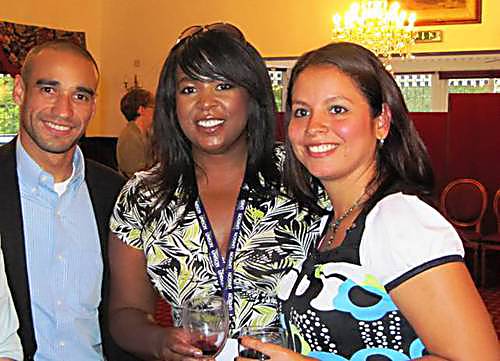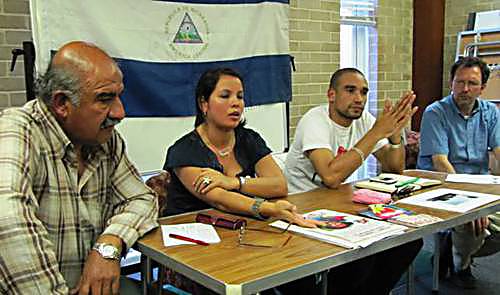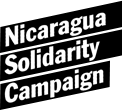Report of speakers tour
NSCAG News |
on: Wednesday, 29 August 2012

At Unison National Delegates Conference, comparing experiences of youth organising, with Mandy Richards (centre) of Hackney Youth Parliament
Nicaragua is no stranger to the horrors of neo-liberal ‘austerity’ economics. At the invitation of Unison International Department, two young Nicaraguan trade union activists visited England and Wales in June 2012 and inspired hundreds of people with their talks on actions taken in their country to counteract the global orthodoxy that is failing the majority so drastically and deepening poverty. Young people are at the forefront of revolutionary economic measures implemented since 2006 when Nicaraguans voted to end the succession of destructive right wing governments. The visitors, Arelis López Salinas and Emerson Silva Urbina, benefitted from the leadership skills training for young people financed by Unison and CWU. “In addition to our union organising work the training helps us communicate and raise awareness among young people”.
Arelis and Emerson represented UNE, the Nicaraguan Public Sector union, on a speaker tour that began with the Unison National Delegates Conference in Bournemouth. Meetings with union members and activists in Oxford, Wolverhampton, Birmingham, Colwyn Bay, Mold, London and of course, Bournemouth, heard how Nicaragua, the second poorest country in the western hemisphere, has once again entered a period of restructure and growth under the Sandinista government. On hearing about the tide of cuts implemented by UK’s Con-Dem government, they added their voices to the clamour already coming out of Latin America, “Don’t go where we’ve been – it doesn’t work!”
The example of Nicaragua is as relevant today as it was in the 1980s during the period of Sandinista government when Margaret Thatcher was in power in UK. At a time when we are so desperate for viable alternatives Arelis and Emerson reported how:
- A range of new laws protects Nicaraguan workers’ rights including collective bargaining
- Education and healthcare is now free to all
- The ‘50/50’ law aims to ensure equal numbers of female and male candidates in upcoming local elections in November
- Femicide is now recognised as a specific crime.
- Nicaragua has seen the highest economic growth of any Central American country, 4.4%
- The government target for energy from renewable sources by 2017 is 96%.
- Young people comprise 60% of the population and are therefore critical to the future of the country. They are organised in work, unions, schools, neighbourhoods, and disaster prevention committees. Being involved in social structures from a young age is seen as instrumental in bringing about positive social change. Arelis and Emerson said “We are in no doubt – the future is in our hands.”
- The average age of a Nicaraguan trade union member is 33. In UK it is 54.
Many of the economic and social advances have been made possible by Nicaragua’s membership of the Bolivarian Alliance for the Peoples of our America (ALBA), a political and economic bloc of progressive Latin American and Caribbean nations. It is built on a common conceptualisation of Latin American development that is not dependent on trade with USA.
Further information: http://www.nicaraguasc.org.uk/campaigns/ALBA/ALBA%20briefing%20Nov%202011%20.pdf

Meeting with Clwyd Latin American Human Rights Group in Mold. Ben Gregory (right) of Wales NSC gives a bilingual Welsh/English introduction, Apollo Santana (left) interprets.





